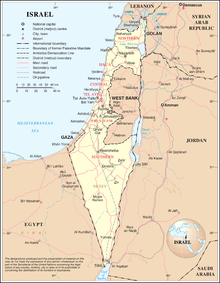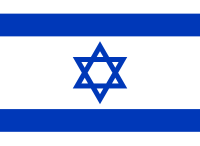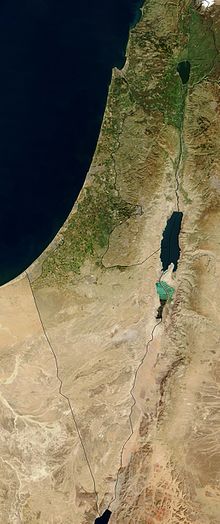The Israeli Declaration of Independence, formally the Declaration of the Establishment of the State of Israel, was proclaimed on 14 May 1948 by David Ben-Gurion, the Executive Head of the World Zionist Organization, Chairman of the Jewish Agency for Palestine, and soon to be first Prime Minister of Israel. It declared the establishment of a Jewish state in Eretz-Israel, to be known as the State of Israel, which would come into effect on termination of the British Mandate at midnight that day. The event is celebrated annually in Israel as Independence Day, a national holiday on 5 Iyar of every year according to the Hebrew calendar.

Jerusalem is a city in West Asia, on a plateau in the Judaean Mountains between the Mediterranean and the Dead Sea. It is one of the oldest cities in the world, and is considered holy to the three major Abrahamic religions—Judaism, Christianity, and Islam. Both the State of Israel and Palestine claim Jerusalem as their capital; Israel maintains its primary governmental institutions there, and Palestine ultimately foresees it as its seat of power. Neither claim, however, is widely recognized internationally.
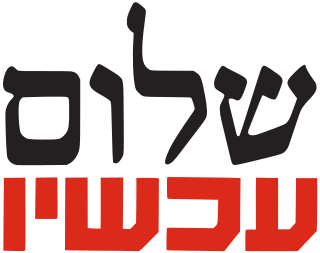
Peace Now is a non-governmental organization, liberal advocacy and activist group in Israel with the aim of promoting a two-state solution to the Israeli-Palestinian conflict.

Rehavam Ze'evi was an Israeli general and politician who founded the right-wing nationalist Moledet party, mainly advocating population transfer.

Yitzhak Rabin was an Israeli politician, statesman and general. He was the fifth prime minister of Israel, serving two terms in office, 1974–1977, and from 1992 until his assassination in 1995.

Israelis are the citizens and nationals of the State of Israel. The country's populace is composed primarily of Jews and Arabs, who respectively account for 75 percent and 20 percent of the national figure; followed by other ethnic and religious minorities, who account for 5 percent.

Yehoshua Porath was an Israeli historian and professor of Middle East history.

Israeli Arabs, colloquially "48-Arabs", most of whom now prefer the term Palestinian citizens of Israel according to most sources, are the largest ethnoreligious minority in Israel. They comprise a diverse community of Israeli citizens who were or are descended from Palestinian citizens before 1948, bilingual in Palestinian Arabic and Hebrew, and who self-identify in a wide range of intersectional civic, national, and religious identities.
Bank Leumi is an Israeli bank. It was founded on February 27, 1902, in Jaffa as the Anglo Palestine Company as subsidiary of the Jewish Colonial Trust Limited formed before in London by members of the Zionist movement to promote the industry, construction, agriculture, and infrastructure of the land hoped to ultimately become Israel. Today, Bank Leumi is Israel's largest bank, with overseas offices in Luxembourg, US, Switzerland, the UK, Mexico, Uruguay, Romania, Jersey, and China.
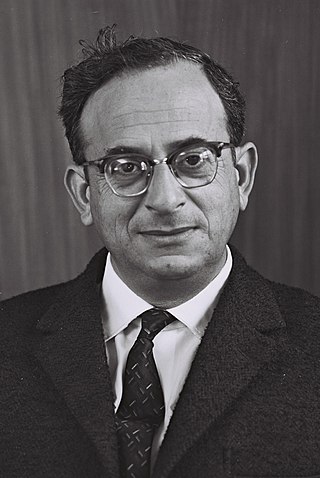
Yitzhak Rachamim Navon was an Israeli politician, diplomat, playwright, and author. He served as the fifth President of Israel between 1978 and 1983 as a member of the centre-left Alignment party. He was the first Israeli president born in Jerusalem and the first Sephardi Jew to serve in that office.

The status of Jerusalem has been described as "one of the most intractable issues in the Israeli–Palestinian conflict" due to the long-running territorial dispute between Israel and the Palestinians, both of which claim it as their capital city. Part of this issue of sovereignty is tied to concerns over access to holy sites in the Abrahamic religions; the current religious environment in Jerusalem is upheld by the "Status Quo" of the former Ottoman Empire. As the Israeli–Palestinian peace process has primarily navigated the option of a two-state solution, one of the largest points of contention has been East Jerusalem, which was part of the Jordanian-annexed West Bank until the beginning of the Israeli occupation in 1967.

Daniel "Danny" Ayalon is an Israeli diplomat, columnist and politician. He served as Deputy Foreign Minister and as a member of the Knesset. He was the Israeli Ambassador to the United States from 2002 until 2006. Previously, he worked as senior foreign policy advisor to Prime Ministers Ariel Sharon, Ehud Barak, and Benjamin Netanyahu.
Textbooks in Israel are published in Israel by the Ministry of Education of Israel and other educational institutions.

Yoav Gelber is a professor of history at the University of Haifa, and was formerly a visiting professor at the University of Texas at Austin.
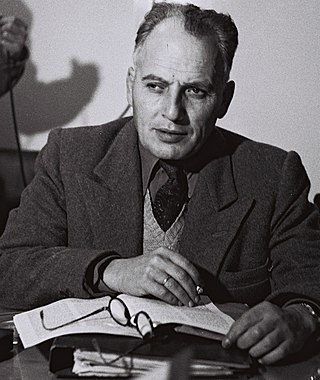
Bechor-Shalom Sheetrit was an Israeli politician, minister and the only signatory of the Israeli declaration of independence to have been born in the country. He served as Minister of Police from independence in 1948 until shortly before his death in 1967, making him the longest-serving cabinet member in the same portfolio to date.
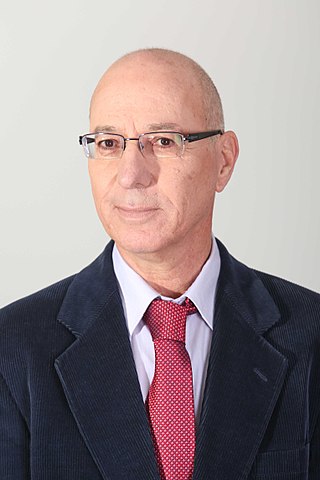
Yitzhak Reiter is an Israeli political scientist. He is a professor specializing in Israel studies and Islamic and Middle East history and politics, teaching at Reichman University and Al-Qasemi College. A senior researcher at the Jerusalem Institute for Policy Research, he formerly chaired the Department of Israel Studies at Ashkelon Academic College.
Events in the year 1949 in Israel.
Basic Law: Israel as the Nation-State of the Jewish People, informally known as the Nation-State Bill or the Nationality Bill, is an Israeli Basic Law that specifies the country's significance to the Jewish people. It was passed by the Knesset—with 62 in favour, 55 against, and two abstentions—on 19 July 2018 and is largely symbolic and declarative in nature. The law outlines a number of roles and responsibilities by which Israel is bound in order to fulfill the purpose of serving as the Jews' nation-state. However, it was met with sharp backlash internationally and has been characterized as racist and undemocratic by some critics. After it was passed, several groups in the Jewish diaspora expressed concern that it was actively violating Israel's self-defined legal status as a "Jewish and democratic state" in exchange for adopting an exclusively Jewish identity. The European Union stated that the Nation-State Bill had complicated the Israeli–Palestinian peace process, while the Arab League, the Palestine Liberation Organization, the Organization of Islamic Cooperation, and the Muslim World League condemned it as a manifestation of apartheid.

Ahmad Tibi is a Palestinian-Israeli politician. The leader of the Ta'al party, he has served as a member of the Knesset since 1999. Tibi was acknowledged as a figure in the Israeli-Palestinian arena after serving as a political advisor to the late Palestinian president Yasser Arafat (1993–1999).

